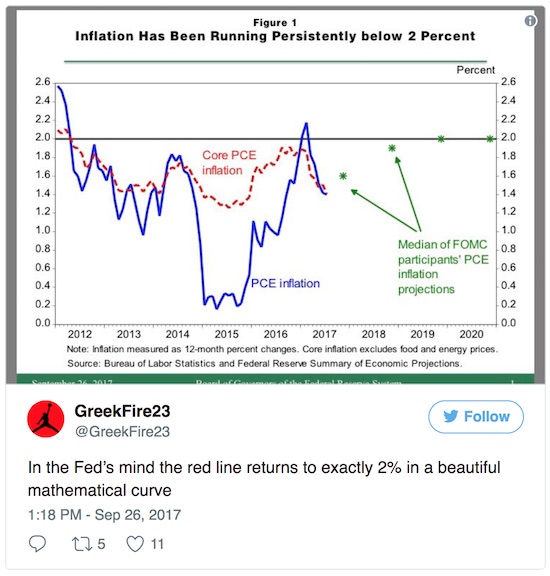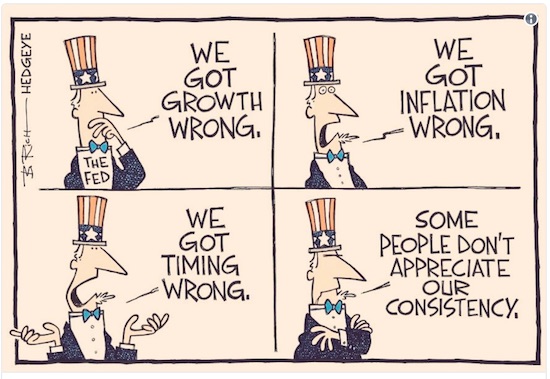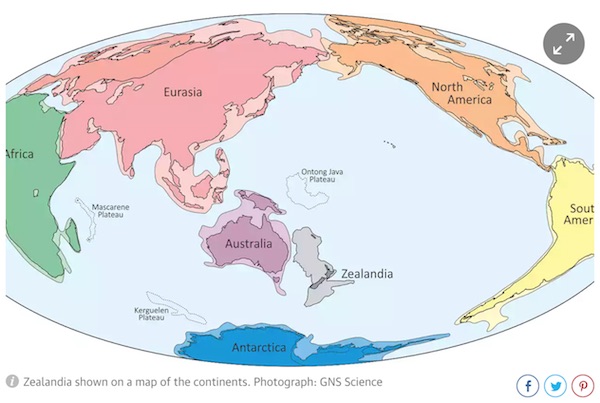
Dorothea Lange Negro woman who has never been out of Mississippi July 1936

In my view this is far too close to “I was only following orders”. Draghi, Lagarde, Bernanke et al are responsible for their own actions.
• The Limits of Lagarde (Varoufakis)
Shortly after the Eurogroup meeting of Eurozone finance ministers on June 27, 2015, I bumped into a worried-looking Mario Draghi, the president of the European Central Bank. “What on earth is Jeroen doing?” he asked me, referring to Jeroen Dijsselbloem, the Eurogroup’s then-president. “Damaging Europe, Mario. Damaging Europe,” I replied. He nodded, looking concerned. We took the elevator to the ground floor and parted silently. Journalists find it natural to assume that Draghi and I had a hostile relationship during the 2015 standoff between Greece, which I represented, and the ECB. But the impasse at which we had become stuck was not caused by a clash of characters, and it involved no mutual recrimination. Rather, it reflected an institutional failure for which I never held Draghi personally responsible. Hostility between us, being unnecessary, was absent.
My fleeting exchange with him came to mind as he recently vacated the electric chair amid much speculation about the ECB’s future direction under his successor, Christine Lagarde. It reminded me of the unacknowledged powerlessness of the ECB president, who leads a mighty institution that is far less independent in practice than it is in theory. Lagarde will now have to reckon with that powerlessness as she steers the ECB in a sea of deflationary hazards. During 2015, Draghi sometimes made decisions detrimental both to the Greek people and to Europe’s common interest. One came on February 4. On that morning, following a meeting I had in London the previous day with financiers to whom I presented my plans for a moderate debt restructuring, the Athens stock exchange index shot up by 13%, led by a gain of more than 20% for Greek bank shares.
With that wind in my sails, I flew to Frankfurt to meet Draghi for the first time. One might think that a freshly appointed eurozone finance minister who had just managed to boost his country’s financial assets significantly would be helped by his central banker. Instead, the ECB’s governing board decided the same day to sever Greek banks’ access to euro liquidity. Unsurprisingly, Greek corporate and banking shares crashed, wiping out the previous day’s gains. In any other country, the position of the central banker would be untenable. The remit of a central bank is to aid the government’s efforts to stabilize finance and support the economy. In the eurozone, however, political constraints force the central bank to inflict the kind of damage Draghi’s ECB visited upon our stock exchange that February afternoon.

And they will have a lot more right soon.
• Millennials Have a Right To Be Pissed at Boomers (Vice)
Just how badly are millennials being screwed out of wealth? Let’s take a look at the data. The Federal Reserve regularly publishes data on the generational gaps in wealth. The boomers have plenty of it, and millennials don’t. That’s no surprise — the boomers are older. But what recent data also clearly shows is that when the boomers were millennials’ age, they had significantly more than millennials do today. Back in 1989, when boomers were between 25 and 43, they already owned 20.9% of the country’s wealth, according to data from the Federal Reserve updated earlier this month. In 2019, millennials are between 23 and 38, and they currently own a whopping 3.2% of wealth. That means boomers had more than six times as much wealth in 1989 as millennials do now.
“I definitely think millennials have a bunch to be uniquely annoyed about,” said Josh Bivens, research director at the Economic Policy Institute. “Lots of them graduated into a horrible labor market, and they’ve probably been very stunted in their ability to get on the treadmill of earning enough to actually save anything.” Looking at wealth over time, any given generation would start out with nothing. (Children don’t own stuff.) As time passes, they’d accumulate wealth, and, eventually, people die and tend to pass their wealth on as inheritance.

“Back in 2016, the credit-card delinquency rate at these banks was in the 3% range. It has more than doubled in two years.”
• What’s Behind the Subprime Consumer Loan Implosion? (WS)
OK, we’ve got a situation in subprime consumer loans. The delinquency rate on credit-card loan balances at the nearly 5,000 smaller commercial banks in the United States – this means all banks except the largest 100 – is blowing out, according to Federal Reserve data. In the third quarter, the delinquency rate at these banks rose to 6.25%. That’s higher even than during the peak of the Financial Crisis. Back in 2016, the credit-card delinquency rate at these banks was in the 3% range. It has more than doubled in two years. Credit card balances are considered delinquent when they’re 30 days or more past due. This delinquency rate means that out of the banks total credit card balances, 6.25% are 30 days or more past due. This is a disturbingly large rate.
But delinquencies are a flow. Balances are removed from the delinquency basket either when the customer cures the delinquency, such as catching up with past-due payments, or when the bank “charges off” the delinquent balance against its loan loss reserves. But as these delinquent balances were taken out of the delinquency basket, even more new delinquencies fell into the basket, and the delinquency rate rose. Subprime auto loans have also been blowing out. In the third quarter, the serious delinquency rate of the $1.3 trillion in auto loans has risen to 4.71%, the highest since the worst months of the Financial Crisis, when the auto industry collapsed, and when the US was facing the worst unemployment crisis since the Great Depression. In the third quarter, about 21% of all subprime auto loans were seriously delinquent – meaning 90 days past due.

The DOJ/Deep State protects its own?
• DOJ Watchdog Expected To Downgrade ‘Spying’ On Trump Campaign (ZH)
In late September, RealClearInvestigations’ Paul Sperry suggested that Inspector General Michael Horowitz – tasked with investigating and exposing wrongdoing at the highest levels – was feared to be pulling punches in order to protect establishment darlings in his upcoming report on the Russia investigation. Now we learn that Horowitz, who volunteered on several Democratic political campaigns while in college and is married to a former liberal political activist, Obama donor and CNN employee, is expected to conclude that the FBI didn’t spy on the Trump campaign. Instead, when longtime FBI / CIA asset Stephan Halper and his undercover FBI ‘assistant’ named “Azra Turk” befriended George Papadopoulos, it was nothing more than “typical law enforcement activities,” according the New York Times.
“Mr. Horowitz found no evidence that Mr. Halper tried to infiltrate the Trump campaign itself, the people familiar with the draft report said, such as by seeking inside campaign information or a role in the organization. The F.B.I. also never directed him to do so, former officials said. Instead, Mr. Halper focused on eliciting information from Mr. Page and Mr. Papadopoulos about their ties to Russia. [..] Mr. Trump and his allies have pointed to some of the investigative steps the F.B.I. took as evidence of spying, though they were typical law enforcement activities. -NYT. Recall that the Obama administration had paid Halper over $1 million over a several years, with nearly half of it surrounding the 2016 election.
The report is also expected to conclude that Maltese professor Joseph Mifsud – who fed Papadopoulos the rumor that Russia had dirt on Hillary Clinton – is not an FBI informant. Mifsud, a self-described member of the Clinton Foundation, has been painted by Western media as a Russian asset. Except, nobody claimed Mifsud was an FBI informant. As The Conservative Treehouse notes, “The concern has always been Mifsud was a western intelligence asset, perhaps CIA.” Moreover, Horowitz will conclude that while the FBI was ‘careless and unprofessional’ in pursuing a wiretap on Trump campaign adviser Carter Page, and that a ‘front-line lawyer’ Kevin Clinesmith, 37, fabricated evidence to support a FISA spy warrant renewal against Page, that the underlying justification to go after Page remained intact.

Belt and Road.
• Papua New Guinea Faces Cash Crunch As China Repayment Schedule Ramps Up (R.)
Papua New Guinea’s annual debt repayments to China are forecast to increase 25% by 2023, new budget figures show, at the same time as the Pacific nation falls to its largest ever deficit. The resource-rich archipelago, which is at the center of a diplomatic tussle between China and the United States, has blamed extravagant spending by the previous administration for its souring finances, which will require the government to borrow even more to pay the bills. Balancing its books has been made more difficult by recalculations to the country’s outstanding debt. It has soared 10 percentage points since the last annual budget to 42% of GDP, above the legal limit of 35%.
“You have some of those loans clicking in; the repayments are going to be a problem,” said Paul Barker, executive director of Port Moresby-based think tank the Institute of National Affairs. Formerly administered by U.S. ally Australia, PNG has in recent years turned increasingly to China for financing as Beijing becomes a bigger player in the region. The U.S. has repeatedly warned that China was using “predatory economics” to destabilize the Indo-Pacific; a charge strongly denied by Beijing.

Yup.
• Britain’s Chief Rabbi Is Helping to Stoke Antisemitism (Cook)
Chief rabbi Ephraim Mirvis has not only misrepresented the known facts about Labour and its supposed antisemitism crisis. He has not only interfered in an overtly, politically partisan manner in the December 12 election campaign by suggesting that Jeremy Corbyn – against all evidence – is an antisemite. By speaking out as the voice of British Jews – a false claim he has allowed the UK media to promote – his unprecedented meddling in the election of Britain’s next leader has actually made the wider Jewish community in the UK much less safe. Mirvis is contributing to the very antisemitism he says he wants to eradicate. Mirvis’ intervention in the election campaign makes sense only if he believes in one of two highly improbable scenarios.
The first requires several demonstrably untrue things to be true. It needs for Corbyn to be a proven antisemite – and not just of the variety that occasionally or accidentally lets slip an antisemitic trope or is susceptible to the unthinking prejudice most of us occasionally display, including (as we shall see) Rabbi Mirvis. No, for Mirvis to have interfered in the election campaign he would need to believe that Corbyn intends actively as prime minister to inflame a wider antisemitism in British society or implement policies designed to harm the Jewish community. And in addition, the chief rabbi would have to believe that Corbyn presides over a Labour party that will willingly indulge race-hate speeches or stand by impassively as Corbyn carries out racist policies.
If Mirvis really believes any of that, I have a bridge to sell him. Corbyn has spent his entire political career as an anti-racism campaigner, and his anti-racism activism as a backbencher was especially prominent inside a party that itself has traditionally taken the political lead in tackling racism. The second possibility is that Mirvis doesn’t really believe that Corbyn is a Goebbels in the making. But if that is so, then his decision to intercede in the election campaign to influence British voters must be based on an equally fanciful notion: that there is no significant threat posed by antisemitism from the right or the rapidly emerging far right. Because if antisemitism is not an issue on the right – the same nationalistic right that has persecuted Jews throughout modern history, culminating in the Nazi atrocities – then Mirvis may feel he can risk playing politics in the name of the Jewish community without serious consequence.

I thought it was funny. But Boris threatens to take Channel 4’s licence away.
• Boris Johnson Replaced By Melting Ice Block In TV Debate (R.)
British broadcaster Channel 4 represented Prime Minister Boris Johnson with a block of melting ice in a prime-time election debate on the environment on Thursday, prompting his Conservative Party to complain this broke impartiality rules. The commercially funded public-service broadcaster invited leaders of all Britain’s main political parties to take part in the debate before Dec. 12’s election, but both Johnson and the leader of the Brexit Party, Nigel Farage, declined to attend. The Conservative Party offered former environment minister Michael Gove as a substitute, but the broadcaster said the debate was only intended for party leaders, and that the other political parties would not agree to change the terms.
“This effectively seeks to deprive the Conservative Party of any representation and attendance,” the Conservatives wrote in a letter of complaint to broadcast regulator Ofcom. British television broadcasters are required to be politically impartial, and face extra balance requirements during election periods. Ofcom can fine broadcasters that do not comply, and as a last resort can cancel a broadcaster’s license. The Conservatives said Thursday’s disagreement was “part of a wider pattern of bias by Channel 4 in recent months”. The broadcaster’s head of news and current affairs, Dorothy Byrne, described Johnson as “a known liar” in a major industry speech in August.

“Six out of 10 Greeks have delayed paying at least one utility bill over the last 12 months..”
• Greeks Are Last In Welfare Chart (K.)
Six out of 10 Greeks have delayed paying at least one utility bill over the last 12 months, and in seven out of 10 of those cases it’s not just a one-off incident but a regular occurrence. Some of those who eventually do pay their bills do so with borrowed money, mainly from friends, according to the findings of the European Consumer Payment Report 2019. The survey of 24,000 consumers in 24 European countries by Swedish company Intrum has brought to light a number of worrying trends on the European level, such as a return to excessive consumer borrowing, something that is spurred considerably by easy access to credit cards and loans obtained via the internet or the telephone, for example.
The report showed that 61 percent of Greeks had failed to pay at least one bill in the previous 12 months, which is the highest rate among the 24 countries surveyed and almost twice the European average of 33 percent. Worse, 68 percent of those who failed to pay on time said they did so regularly, also the highest rate in Europe, against an average rate of 47 percent. Furthermore, Greeks also had the highest rate (40 percent) of people who had borrowed money or maxed out their credit cards. The European average stands at just 24 percent, based on data from the 24 countries surveyed by Intrum.

Three articles on Proice Andrew, just to indicate how much the pressure increases. Will The Firm give him up to save itself?
• ‘There Is Only One Of Us Telling The Truth’ – Virginia Giuffre (Ind.)
The woman who claims she was forced into sex with Prince Andrew as a teenager said in her first UK interview: “He knows what happened, I know what happened and there’s only one of us telling the truth.” Virginia Giuffre, previously known as Virginia Roberts, said being caught up with the Duke of York and Jeffrey Epstein was “a really scary time in my life”. The BBC‘s Panorama programme released a trailer on Twitter of its upcoming episode, which features an interview with Ms Giuffre, who claims she was made to sleep with Andrew when she was 17. The hour-long episode, titled The Prince and the Epstein Scandal, will be screened on BBC One on Monday.
Ms Giuffre alleges the duke had sex with her on three separate occasions. He denies the allegations and has insisted he has “no recollection of ever meeting this lady”. Ms Giuffre has also criticised the Metropolitan Police for failing to investigate her allegations. In a statement on Thursday, the Met said it stood by its decision not to investigate claims by the duke’s accuser, and added that officers had spoken to other law enforcement agencies but have “not received a formal request asking for assistance”. The Met said it reviewed its previous decision that it was “not the appropriate authority to conduct inquiries in these circumstances” following Epstein’s death in August, and that its position remained unchanged.
Epstein took his own life in a New York prison while he was being held on sex trafficking charges. William Barr, the US attorney general, has slapped down conspiracy theories claiming the trafficker was murdered, saying that he died in a “perfect storm of screw-ups”.

Publishers can’t not look at this, it’s too lucrative.
• Prince Andrew’s Ex Mulling Bombshell Tell-All Book (NYP)
Prince Andrew’s socialite ex is considering penning an explosive tell-all book — including details of a dinner party with Jeffrey Epstein attended by both Bill Clinton and Donald Trump, it was claimed Thursday. Lady Victoria Hervey, 43, has already been doing interviews discussing her brief fling with the Duke of York and how it threw her into the heart of Epstein’s depraved world. She says she was introduced to the pedophile by his accused madam Ghislaine Maxwell — who she likened to a James Bond character — and feels she only escaped Epstein’s clutches because she was “too old.” But Hervey kept back many of the juiciest details, which she now could put in an explosive book that could further embarrass the disgraced duke, according to The Sun.
“There is a lot that she has never revealed about the Royal family, members of high society and big-named stars,” a source close to her told the paper. “She’s done many interviews but has always kept many things under her belt. “She feels like now is the right time to get some things off her chest — including about Prince Andrew, Jeffrey Epstein and Ghislaine Maxwell. “She’d been a part of that social scene for many years.” Hervey’s “really explosive life” also includes “debauched drug-fueled parties, threesomes with celebrities — all sorts,” the source told The Sun of her book plans. “She has had a lucrative offer to write a book and she’s definitely considering it,” the source said.

G-d only knows why anyone would want to watch this sort of thing, but now the royal family is forever linked to pedophilia.
• How Prince Andrew Forced Me To Recognise The Hollowness Of The Crown (G.)
Before the advent of The Crown – the Netflix show, not the institution – Princess Margaret was widely regarded as a snobbish, spiteful creature. That image has been refurbished: to fans of the show, she is firmly established as poor Margaret, the dazzling, tragic second fiddle to the Queen, who only wanted a meaningful role. After two seasons, I had been thinking of Margaret this way myself, while gussying up uncharacteristically warm feelings for the royals. The Queen does a good job, I thought. So what if she’s a little dull, isn’t that the bedrock of service – dependability? It’s not often one has one’s delusions dismantled in real time, but so it has been, this past fortnight, witnessing Prince Andrew’s flagrant awfulness in tandem with The Crown’s terrible third season. The experience has been like a sudden, dramatic return to reason.
There was never a subversive element to The Crown, and nor was there need for one. As we know from the small amount of documentary footage that exists of the Queen in her off-hours, the most outlandish drama one can eke from the royals lies in the depiction of them doing “ordinary” things: watching TV, smiling. This drama only works if one is willing to be charmed, a feat that the early seasons achieved. They also adhered to the narrative put forward by the House of Windsor itself: however misguided its application, the animating principle of all royals – with the exception of Edward VIII – was duty, honour, loyalty. If the royals have a fault, the show suggests, it is that they take these principles too seriously, particularly when they come into conflict with more human considerations.
In Prince Andrew’s catastrophic TV interview, the precise, delusional nature of his language – his now infamous line, “my judgment was probably coloured by my tendency to be too honourable” – mirrored so exactly the ethos of the show, it could have served as its tag line. One can only imagine how the script, in its current form, would treat Andrew’s predicament: as the story of a prince crushed by the weight of his own nobility; the tragedy of a man whose saucy impulses had nowhere to go.



Please support the Automatic Earth on Paypal and Patreon so we can continue to publish.
Top of the page, left and right sidebars. Thank you.













